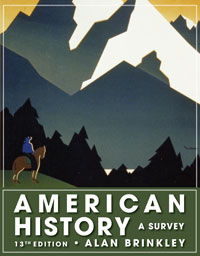American History: A Survey (Brinkley), 13th EditionChapter 7:
THE JEFFERSONIAN ERA Main themes of Chapter Seven: - How Americans expressed their burgeoning cultural independence through republican education, literature, and religious revivalism
- The impact of industrialism on the United States and its people, particularly with regard to agricultural technology and transportation
- The domestic questions and foreign entanglements of Thomas Jefferson's presidency, including Marbury v. Madison, the Louisiana Purchase, the settling of the West, and the impressment and embargo controversies
- The response of the American people and their political system to the nation's physical expansion, and the reaction of Native American groups to this expansion
- The growing conflict between British naval policies and American self-identity that led to the War of 1812, and its ultimate consequences for the young American nation
A thorough study of Chapter Seven should enable the student to understand the following:- The role of republican education in creating a "virtuous and enlightened citizenry"
- The American cultural and nationalist aspirations beginning to emerge in the first two decades of the nineteenth century
- The effects of the revolutionary experience on American religion, and the changing religious patterns that helped bring on the Second Great Awakening
- The growing industrialism of America and the important advances made in technology and transportation during Jefferson's presidency, belying the simple, agrarian republic envisioned by the Jeffersonians
- The political philosophy of Thomas Jefferson, and the extent to which he was able to adhere to his philosophy while president
- The origins and compromises that led to the creation of Washington, D.C. as America's capital
- The Jeffersonian-Federalist struggle over the judiciary—its causes, the main points of conflict, and the importance of the outcome for the future of the nation
- President Jefferson's constitutional reservations concerning the Louisiana Purchase, and the significance of his decision to accept the bargain
- The reasons for President Jefferson's sponsorship of the Lewis and Clark expedition, and the importance of that expedition
- The strange story of Aaron Burr, his duel with Alexander Hamilton, and his trial for "conspiracy"
- The problems caused by Tecumseh's attempts at confederation and by the Spanish presence in Florida as Americans surged westward
- The motivations behind Thomas Jefferson and James Madison's strategy of "peaceable coercion," and why it ultimately failed
- The international events leading up to the War of 1812, and the domestic forces encouraging the war
- The extent of the opposition to the American war effort, and the ways in which the New England Federalists attempted to show their objections
- The end of the War of 1812, and the treaties accompanying it
- The comparative role of the United States in the "global industrial revolution" that originated in Great Britain
 |  |





